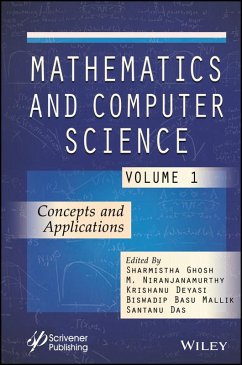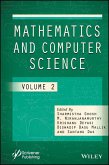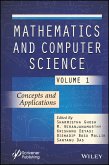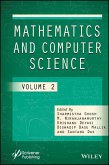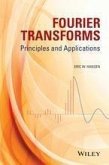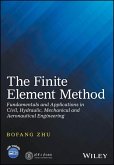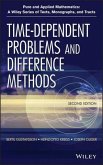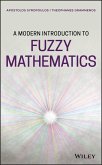Mathematics and Computer Science, Volume 1 (eBook, ePUB)
Redaktion: Ghosh, Sharmistha; Das, Santanu; Mallik, Biswadip Basu; Deyasi, Krishanu; Niranjanamurthy, M.


Alle Infos zum eBook verschenken

Mathematics and Computer Science, Volume 1 (eBook, ePUB)
Redaktion: Ghosh, Sharmistha; Das, Santanu; Mallik, Biswadip Basu; Deyasi, Krishanu; Niranjanamurthy, M.
- Format: ePub
- Merkliste
- Auf die Merkliste
- Bewerten Bewerten
- Teilen
- Produkt teilen
- Produkterinnerung
- Produkterinnerung

Hier können Sie sich einloggen

Bitte loggen Sie sich zunächst in Ihr Kundenkonto ein oder registrieren Sie sich bei bücher.de, um das eBook-Abo tolino select nutzen zu können.
MATHEMATICS AND COMPUTER SCIENCE This first volume in a new multi-volume set gives readers the basic concepts and applications for diverse ideas and innovations in the field of computing together with its growing interactions with mathematics. This new edited volume from Wiley-Scrivener is the first of its kind to present scientific and technological innovations by leading academicians, eminent researchers, and experts around the world in the areas of mathematical sciences and computing. The chapters focus on recent advances in computer science, and mathematics, and where the two intersect to…mehr
- Geräte: eReader
- mit Kopierschutz
- eBook Hilfe
- Größe: 33.27MB
![Mathematics and Computer Science, Volume 2 (eBook, ePUB) Mathematics and Computer Science, Volume 2 (eBook, ePUB)]() Mathematics and Computer Science, Volume 2 (eBook, ePUB)173,99 €
Mathematics and Computer Science, Volume 2 (eBook, ePUB)173,99 €![Mathematics and Computer Science, Volume 1 (eBook, PDF) Mathematics and Computer Science, Volume 1 (eBook, PDF)]() Mathematics and Computer Science, Volume 1 (eBook, PDF)173,99 €
Mathematics and Computer Science, Volume 1 (eBook, PDF)173,99 €![Mathematics and Computer Science, Volume 2 (eBook, PDF) Mathematics and Computer Science, Volume 2 (eBook, PDF)]() Mathematics and Computer Science, Volume 2 (eBook, PDF)173,99 €
Mathematics and Computer Science, Volume 2 (eBook, PDF)173,99 €![Fourier Transforms (eBook, ePUB) Fourier Transforms (eBook, ePUB)]() Eric W. HansenFourier Transforms (eBook, ePUB)111,99 €
Eric W. HansenFourier Transforms (eBook, ePUB)111,99 €![The Finite Element Method (eBook, ePUB) The Finite Element Method (eBook, ePUB)]() Bofang ZhuThe Finite Element Method (eBook, ePUB)139,99 €
Bofang ZhuThe Finite Element Method (eBook, ePUB)139,99 €![Time-Dependent Problems and Difference Methods (eBook, ePUB) Time-Dependent Problems and Difference Methods (eBook, ePUB)]() Bertil GustafssonTime-Dependent Problems and Difference Methods (eBook, ePUB)134,99 €
Bertil GustafssonTime-Dependent Problems and Difference Methods (eBook, ePUB)134,99 €![A Modern Introduction to Fuzzy Mathematics (eBook, ePUB) A Modern Introduction to Fuzzy Mathematics (eBook, ePUB)]() Apostolos SyropoulosA Modern Introduction to Fuzzy Mathematics (eBook, ePUB)103,99 €
Apostolos SyropoulosA Modern Introduction to Fuzzy Mathematics (eBook, ePUB)103,99 €-
-
-
Dieser Download kann aus rechtlichen Gründen nur mit Rechnungsadresse in A, B, BG, CY, CZ, D, DK, EW, E, FIN, F, GR, HR, H, IRL, I, LT, L, LR, M, NL, PL, P, R, S, SLO, SK ausgeliefert werden.
- Produktdetails
- Verlag: John Wiley & Sons
- Seitenzahl: 560
- Erscheinungstermin: 19. Juli 2023
- Englisch
- ISBN-13: 9781119879817
- Artikelnr.: 68538795
- Verlag: John Wiley & Sons
- Seitenzahl: 560
- Erscheinungstermin: 19. Juli 2023
- Englisch
- ISBN-13: 9781119879817
- Artikelnr.: 68538795
- Herstellerkennzeichnung Die Herstellerinformationen sind derzeit nicht verfügbar.
1) Using Product Means (E,s)( N, pn ,,qn) n of) the Conjugate Fourier Series 1 Aradhana Dutt Jauhari and Pankaj Tiwar 1.1 Introduction 1 1.1.1 Definition 1 2 1.1.2 Definition 2 2 1.1.3 Definition 3 2 1.2 Theorems 5 1.2.1 Theorem 1 5 1.2.2 Theorem 2 5 1.3 Lemmas 6 1.3.1 Lemma 1 6 1.3.2 Lemma 2 6 1.3.3 Lemma 3 9 1.4 Proof of the Theorems 9 1.4.1 Proof of the Theorem 1 9 1.4.2 Proof of the Theorem 2 15 1.5 Corollaries 16 1.5.1 Corollary 1 16 1.5.2 Corollary 2 16 1.6 Example 16 1.7 Conclusion 18 References 18 2 Blow Up and Decay of Solutions for a Klein-Gordon Equation With Delay and Variable Exponents 21 Hazal Yüksekkaya and Erhan Pi
kin 2.1 Introduction 21 2.2 Preliminaries 23 2.3 Blow Up of Solutions 26 2.4 Decay of Solutions 36 Acknowledgment 43 References 43 3 Some New Inequalities Via Extended Generalized Fractional Integral Operator for Chebyshev Functional 45 Bhagwat R. Yewale and Deepak B. Pachpatte 3.1 Introduction 45 3.2 Preliminaries 46 3.3 Fractional Inequalities for the Chebyshev Functional 47 3.4 Fractional Inequalities in the Case of Extended Chebyshev Functional 53 3.5 Some Other Fracional Inequalities Related to the Extended Chebyshev Functional 57 3.6 Concluding Remark 63 References 64 4 Blow Up of the Higher-Order Kirchhoff-Type System With Logarithmic Nonlinearities 67 Nazl
Irkil and Erhan Pi
kin 4.1 Introduction 67 4.2 Preliminaries 69 4.3 Blow Up for Problem for E (0) < d 78 4.4 Conclusion 84 References 85 5 Developments in Post-Quantum Cryptography 89 Srijita Sarkar, Saranya Kumar, Anaranya Bose and Tiyash Mukherjee 5.1 Introduction 90 5.2 Modern-Day Cryptography 90 5.2.1 Symmetric Cryptosystems 91 5.2.2 Asymmetric Cryptosystems 91 5.2.3 Attacks on Modern Cryptosystems 92 5.2.3.1 Known Attacks 93 5.2.3.2 Side-Channel Attacks 93 5.3 Quantum Computing 93 5.3.1 The Main Aspects of Quantum Computing 94 5.3.2 Shor's Algorithm 95 5.3.3 Grover's Algorithm 96 5.3.4 The Need for Post-Quantum Cryptography 96 5.4 Algorithms Proposed for Post-Quantum Cryptography 97 5.4.1 Code-Based Cryptography 97 5.4.2 Lattice-Based Cryptography 98 5.4.3 Multivariate Cryptography 99 5.4.4 Hash-Based Cryptography 99 5.4.5 Supersingular Elliptic Curve Isogeny Cryptography 100 5.4.6 Quantum-Resistant Symmetric Key Cryptography 100 5.5 Launching of the Project Called "Open Quantum Safe" 100 5.6 Algorithms Proposed During the NIST Standardization Procedure for Post-Quantum Cryptography 101 5.7 Hardware Requirements of Post-Quantum Cryptographic Algorithms 101 5.7.1 NTRUEncrypt 101 5.7.1.1 Polynomial Multiplication 102 5.7.1.2 Hardware to Accelerate NTRUEncrypt 103 5.7.2 Hardware-Software Design to Implement PCQ Algorithms 103 5.7.3 Implementation of Cryptographic Algorithms Using HLS 103 5.8 Challenges on the Way of Post-Quantum Cryptography 104 5.9 Post-Quantum Cryptography Versus Quantum Cryptography 105 5.10 Future Prospects of Post-Quantum Cryptography 106 References 107 6 A Statistical Characterization of MCX Crude Oil Price with Regard to Persistence Behavior and Seasonal Anomaly 111 Anindita Bhattacharjee, Jaya Mamta Prosad and M.K. Das 6.1 Introduction 111 6.2 Related Literature 113 6.3 Data Description and Methodology 114 6.3.1 Data 114 6.3.2 Methodology 115 6.3.2.1 Characterizing Persistence Behavior of Crude Oil Return Time Series Using Hurst Exponent 115 6.3.2.2 Zipf Plot 116 6.3.2.3 Seasonal Anomaly in Oil Returns 117 6.4 Analysis and Findings 117 6.4.1 Persistence Behavior of Daily Oil Stock Price 117 6.4.2 Detecting Seasonal Pattern in Oil Prices 121 6.5 Conclusion and Implications 123 References 125 Appendix 128 7 Some Fixed Point and Coincidence Point Results Involving G
-Type Weakly Commuting Mappings 133 Krishna Kanta Sarkar, Krishnapada Das and Abhijit Pramanink 7.1 Introduction 133 7.2 Definitions and Mathematical Preliminaries 134 7.2.1 Definition: G-metric Space (G-ms) 134 7.2.2 Definition: t-norm 135 7.2.3 Definition: t-norm of Had?i
type (H-type) 135 7.2.4 Definition: G-fuzzy metric space (G-fms) 135 7.2.5 Definition 136 7.2.6 Lemma 136 7.2.7 Lemma 136 7.2.8 Definition 136 7.2.9 Definition 136 7.2.10 Definition:
-Function 136 7.2.11 Definition:
-Function 137 7.2.12 Lemma 137 7.2.13 Definition 138 7.2.14 Definition 138 7.2.15 Definition 138 7.2.16 Definition 138 7.2.17 Definition 139 7.2.18 Remarks 139 7.2.19 Lemma 139 7.3 Main Results 140 7.3.1 Theorem 140 7.3.2 Theorem 144 7.3.3 Definition
-Function 151 7.3.4 Theorem 152 7.3.5 Theorem 159 7.3.6 Corollary 167 7.3.7 Corollary 168 7.3.8 Example 169 7.3.9 Example 169 7.3.10 Example 170 7.3.11 Example 170 7.4 Conclusion 170 7.5 Open Question 171 References 171 8 Grobner Basis and Its Application in Motion of Robot Arm 173 Anjan Samanta 8.1 Introduction 173 8.1.1 Define Orderings in K[y1 , ., yn] 174 8.1.2 Introducing Division Rule in K[y1 , ., yn] 174 8.2 Hilbert Basis Theorem and Grobner Basis 175 8.3 Properties of Grobner Basis 175 8.4 Applications of Grobner Basis 176 8.4.1 Ideal Membership Problem 176 8.4.2 Solving Polynomial Equations 177 8.5 Application of Grobner Basis in Motion of Robot Arm 178 8.5.1 Geometric Elucidation of Robots 178 8.5.2 Mathematical Representation 179 8.5.3 Forward Kinematic Problem 179 8.5.4 Inverse Kinematic Problem 182 8.6 Conclusion 189 References 189 9 A Review on the Formation of Pythagorean Triplets and Expressing an Integer as a Difference of Two Perfect Squares 191 Souradip Roy, Tapabrata Bhattacharyya, Subhadip Roy, Souradeep Paul and Arpan Adhikary 9.1 Introduction 191 9.2 Calculation of Triples 193 9.2.1 Calculation for Odd Numbers 193 9.2.2 Calculation for Even Numbers 195 9.2.3 Code Snippet 199 9.2.4 Observation 200 9.3 Computing the Number of Primitive Triples 200 9.3.1 Calculation for Odd Numbers 200 9.3.2 Calculation for Even Numbers 203 9.3.3 Code Snippet 204 9.3.4 Observation 205 9.4 Representation of Integers as Difference of Two Perfect Squares 205 9.4.1 Calculation for Odd Numbers 205 9.4.2 Calculation for Even Numbers 206 9.4.3 Corollaries 208 9.4.4 Code Snippet 210 9.4.5 Output 210 9.5 Conclusion 211 References 211 10 Solution of Matrix Games With Pay
Offs of Single-Valued Neutrosophic Numbers and Its Application to Market Share Problem 213 Mijanur Rahaman Seikh and Shibaji Dutta 10.1 Introduction 213 10.2 Preliminaries 216 10.3 Matrix Games With SVNN Pay-Offs and Concept of Solution 218 10.4 Mathematical Model Construction for SVNNMG 219 10.4.1 Algorithm for Solving SVNNMG 223 10.5 Numerical Example 224 10.5.1 A Market Share Problem 224 10.5.2 The Solution Procedure and Result Discussion 226 10.5.3 Analysis and Comparison of Results With li and Nan's Approach 227 10.6 Conclusion 228 References 228 11 A Novel Score Function-Based EDAS Method for the Selection of a Vacant Post of a Company with q-Rung Orthopair Fuzzy Data 231 Utpal Mandal and Mijanur Rahaman Seikh 11.1 Introduction 231 11.2 Preliminaries 234 11.3 A Novel Score Function of q-ROFNs 236 11.3.1 Some Existing q-ROF Score Functions 236 11.3.2 A Novel Score Function of q-ROFNs 237 11.4 EDAS Method for q-ROF MADM Problem 240 11.5 Numerical Example 244 11.6 Comparative Analysis 246 11.7 Conclusions 247 Acknowledgments 248 References 248 12 Complete Generalized Soft Lattice 251 Manju John and Susha D. 12.1 Introduction 251 12.2 Soft Sets and Soft Elements-Some Basic Concepts 252 12.3 gs-Posets and gs-Chains 253 12.4 Soft Isomorphism and Duality of gs-Posets 257 12.5 gs-Lattices and Complete gs-Lattices 259 12.6 s-Closure System and s-Moore Family 264 12.7 Complete gs-Lattices From s-Closure Systems 266 12.8 A Representation Theorem of a Complete gs-Lattice as an s-Closure System 267 12.9 gs-Lattices and Fixed Point Theorem 268 References 269 13 Data Representation and Performance in a Prediction Model 271 Apurbalal Senapati, Soumen Maji and Arunendu Mondal 13.1 Introduction 272 13.1.1 Various Methods for Predictive Modeling 272 13.1.2 Problem Definition 275 13.2 Data Description and Representations 276 13.3 Experiment and Result 281 13.4 Error Analysis 282 13.5 Conclusion 283 References 284 14 Video Watermarking Technique Based on Motion Frames by Using Encryption Method 285 Praful Saxena and Santosh Kumar 14.1 Introduction 286 14.2 Methodology Used 287 14.2.1 Discrete Wavelet Transform 287 14.2.2 Singular-Value Decomposition 289 14.3 Literature Review 289 14.4 Watermark Encryption 290 14.5 Proposed Watermarking Scheme 292 14.5.1 Watermark Embedding 292 14.5.2 Watermark Extraction 294 14.6 Experimental Results 296 14.7 Conclusion 297 References 298 15 Feature Extraction and Selection for Classification of Brain Tumors 299 Saswata Das 15.1 Introduction 299 15.2 Related Work 301 15.3 Methodology 303 15.3.1 Contrast Enhancement 303 15.3.2 K-Means Clustering 303 15.3.3 Canny Edge Detection 305 15.3.4 Feature Extraction 308 15.3.5 Feature Selection 309 15.3.5.1 Genetic Algorithm for Feature Selection 309 15.3.5.2 Particle Swarm Optimization for Feature Selection 311 15.4 Results 313 15.5 Future Scope 313 15.6 Conclusion 314 References 315 16 Student's Self-Esteem on the Self-Learning Module in Mathematics 6 317 Ariel Gulla Villar and Biswadip Basu Mallik 16.1 Introduction 318 16.1.1 Research Questions 318 16.1.2 Scope and Limitation 319 16.1.3 Significance of the Study 319 16.2 Methodology 320 16.2.1 Research Design 320 16.2.2 Respondents of the Study 320 16.2.3 Sampling Procedure 320 16.2.4 Locale of the Study 320 16.2.5 Data Collection 321 16.2.6 Instrument of the Study 321 16.2.7 Validation of Instrument 321 16.3 Results and Discussion 322 16.4 Conclusion 329 16.5 Recommendation 330 References 331 17 Effects on Porous Nanofluid due to Internal Heat Generation and Homogeneous Chemical Reaction 333 Hiranmoy Mondal and Sharmistha Ghosh Nomenclature 334 17.1 Introduction 334 17.2 Mathematical Formulations 336 17.3 Method of Local Nonsimilarity 341 17.4 Results and Discussions 342 17.5 Concluding Remarks 348 References 349 18 Numerical Solution of Partial Differential Equations: Finite Difference Method 353 Roushan Kumar, Rakhi Tiwari and Rashmi Prasad 18.1 Introduction 353 18.2 Finite Difference Method 356 18.2.1 Finite Difference Approximations to Derivatives 356 18.2.2 Discretization of Domain 356 18.2.3 Difference Scheme of Partial Differential Equation 358 18.3 Multilevel Explicit Difference Schemes 360 18.4 Two-Level Implicit Scheme 364 18.5 Conclusion 371 References 371 19 Godel Code Enciphering for QKD Protocol Using DNA Mapping 373 Partha Sarathi Goswami and Tamal Chakraborty 19.1 Introduction 374 19.2 Related Work 375 19.3 The DNA Code Set 376 19.4 Godel Code 376 19.5 Key Exchange Protocol 378 19.6 Encoding and Decoding of the Plain Text- The QKD Protocol 378 19.6.1 Plain Text to Encoded Text and Vice-Versa 379 19.6.2 The Proposed Message Passing Scheme 380 19.6.3 Illustration 381 19.7 Experimental Setup 388 19.8 Detection Probability and Dark Counts 389 19.9 Security Analysis of Our Algorithm 390 19.10 Conclusion 393 References 393 20 Predictive Analysis of Stock Prices Through Scikit-Learn: Machine Learning in Python 397 Vikash Kumar Mishra, Richa Binyala, Pratibha Sharma and Simran Singh 20.1 Introduction 397 20.2 Study Area and Dataset 398 20.3 Methodology 399 20.4 Results 401 20.5 Conclusion 402 References 403 21 Pose Estimation Using Machine Learning and Feature Extraction 405 J. Palanimeera and K. Ponmozhi 21.1 Introduction 406 21.2 Related Work 408 21.3 Proposed Work 409 21.3.1 Yoga Posture Identification 410 21.3.1.1 Deep Extraction of a Normal Image 410 21.3.1.2 Human Joints Identification 411 21.3.1.3 Extraction of L-DoD Features 411 21.3.1.4 Extraction of D-GoD Features 415 21.3.2 The Random Forest Classifier's Design 416 21.3.2.1 Construction of a Random Forest Model 416 21.3.2.2 Random Forest Two-Way Voting 417 21.3.3 Joint Positioning in Humans 418 21.4 Outcome and Discussion 420 21.5 Conclusion 422 References 423 22 E-Commerce Data Analytics Using Web Scraping 425 Vikash Kumar Mishra, Bosco Paul Alapatt, Aaditya Aggarwal and Divya Khemani 22.1 Introduction 425 22.1.1 Uses of Web Scraping 426 22.2 Research Objective 426 22.3 Literature Review 427 22.4 Feasibility and Application 428 22.4.1 Web Scrapers Process 428 22.5 Proposed Methodology 428 22.5.1 Coding Phase 429 22.5.2 Spreadsheet Analysis and Results 432 22.6 Conclusion 433 References 433 23 A New Language-Generating Mechanism of SNPSSP 435 Prithwineel Paul, Soumadip Ghosh and Anjan Pal 23.1 Introduction 436 23.2 Spiking Neural P Systems With Structural Plasticity ((SNPSSP) 437 23.3 Labeled SNPSSP (LSNPSSP) 440 23.3.1 Working of LSNPSSP 441 23.4 Main Results 442 23.5 Conclusion 450 References 450 24 Performance Analysis and Interpretation Using Data Visualization 455 Vikash Kumar Mishra, Iyyappan, M., Muskan Soni and Neha Jain 24.1 Introduction 455 24.2 Selecting Data Set 456 24.3 Proposed Methodology 457 24.4 Results 458 24.5 Conclusion 460 References 460 25 Dealing with Missing Values in a Relation Dataset Using the DROPNA Function in Python 463 Vikash Kumar Mishra, Shoney Sebastian, Maria Iqbal and Yashwin Anand 25.1 Introduction 464 25.2 Background 464 25.3 Study Area and Data Set 464 25.4 Methodology 466 25.5 Results 468 25.6 Conclusion 468 25.7 Acknowledgment 469 References 469 26 A Dynamic Review of the Literature on Blockchain-Based Logistics Management 471 C. Devi Parameswari and M. Ilayaraja 26.1 Introduction 471 26.2 Blockchain Concepts and Framework 473 26.3 Study of the Literature 475 26.3.1 Blockchain Technology and Supply Chain Trust 475 26.4 Challenges and Processes of Supply Chain Transparency 477 26.4.1 Motivation for Transparency in Data 478 26.5 Challenges in Security 478 26.6 Discussion: In Terms of Supply Chain Dynamics, Blockchain Technology and Supply Chain Integration 479 26.7 Conclusion 481 Acknowledgment 481 References 482 27 Prediction of Seasonal Aliments Using Big Data: A Case Study 485 K. Indhumathi and K. Sathesh Kumar 27.1 Introduction 486 27.2 Related Works 486 27.3 Conclusion 489 References 490 28 Implementation of Tokenization in Natural Language Processing Using NLTK Module of Python 493 Vikash Kumar Mishra, Abhimanyu Dhyani, Sushree Barik and Tanish Gupta 28.1 Introduction 493 28.2 Background 494 28.3 Study Area and Data Set 495 28.4 Proposed Methodology 495 28.5 Result 498 28.6 Conclusion 500 28.7 Acknowledgment 501 Conflicts of Interest/Competing Interests 501 Availability of Data and Material 503 References 503 29 Application of Nanofluids in Heat Exchanger and its Computational Fluid Dynamics 505 M. Appadurai, E. Fantin Irudaya Raj and M. Chithambara Thanu 29.1 Computational Fluid Dynamics 506 29.1.1 Continuity Equation 506 29.1.2 Momentum Equation 507 29.1.3 Energy Equation 508 29.1.4 Equations for Turbulent Flows 510 29.2 Nanofluids 510 29.2.1 Viscosity 511 29.2.2 Density 511 29.2.3 Heat Capacity 512 29.2.4 Thermal Conductivity 512 29.3 Preparation of Nanofluids 512 29.3.1 One-Step Method 513 29.3.2 Two-Step Method 514 29.3.3 Nanofluids Implementation in Heat Exchanger 515 29.4 Use of Computational Fluid Dynamics for Nanofluids 517 29.5 CFD Approach to Solve Heat Exchanger 518 29.6 Conclusion 522 References 522 About the Editors 525 Index 527
1) Using Product Means (E,s)( N, pn ,,qn) n of) the Conjugate Fourier Series 1 Aradhana Dutt Jauhari and Pankaj Tiwar 1.1 Introduction 1 1.1.1 Definition 1 2 1.1.2 Definition 2 2 1.1.3 Definition 3 2 1.2 Theorems 5 1.2.1 Theorem 1 5 1.2.2 Theorem 2 5 1.3 Lemmas 6 1.3.1 Lemma 1 6 1.3.2 Lemma 2 6 1.3.3 Lemma 3 9 1.4 Proof of the Theorems 9 1.4.1 Proof of the Theorem 1 9 1.4.2 Proof of the Theorem 2 15 1.5 Corollaries 16 1.5.1 Corollary 1 16 1.5.2 Corollary 2 16 1.6 Example 16 1.7 Conclusion 18 References 18 2 Blow Up and Decay of Solutions for a Klein-Gordon Equation With Delay and Variable Exponents 21 Hazal Yüksekkaya and Erhan Pi
kin 2.1 Introduction 21 2.2 Preliminaries 23 2.3 Blow Up of Solutions 26 2.4 Decay of Solutions 36 Acknowledgment 43 References 43 3 Some New Inequalities Via Extended Generalized Fractional Integral Operator for Chebyshev Functional 45 Bhagwat R. Yewale and Deepak B. Pachpatte 3.1 Introduction 45 3.2 Preliminaries 46 3.3 Fractional Inequalities for the Chebyshev Functional 47 3.4 Fractional Inequalities in the Case of Extended Chebyshev Functional 53 3.5 Some Other Fracional Inequalities Related to the Extended Chebyshev Functional 57 3.6 Concluding Remark 63 References 64 4 Blow Up of the Higher-Order Kirchhoff-Type System With Logarithmic Nonlinearities 67 Nazl
Irkil and Erhan Pi
kin 4.1 Introduction 67 4.2 Preliminaries 69 4.3 Blow Up for Problem for E (0) < d 78 4.4 Conclusion 84 References 85 5 Developments in Post-Quantum Cryptography 89 Srijita Sarkar, Saranya Kumar, Anaranya Bose and Tiyash Mukherjee 5.1 Introduction 90 5.2 Modern-Day Cryptography 90 5.2.1 Symmetric Cryptosystems 91 5.2.2 Asymmetric Cryptosystems 91 5.2.3 Attacks on Modern Cryptosystems 92 5.2.3.1 Known Attacks 93 5.2.3.2 Side-Channel Attacks 93 5.3 Quantum Computing 93 5.3.1 The Main Aspects of Quantum Computing 94 5.3.2 Shor's Algorithm 95 5.3.3 Grover's Algorithm 96 5.3.4 The Need for Post-Quantum Cryptography 96 5.4 Algorithms Proposed for Post-Quantum Cryptography 97 5.4.1 Code-Based Cryptography 97 5.4.2 Lattice-Based Cryptography 98 5.4.3 Multivariate Cryptography 99 5.4.4 Hash-Based Cryptography 99 5.4.5 Supersingular Elliptic Curve Isogeny Cryptography 100 5.4.6 Quantum-Resistant Symmetric Key Cryptography 100 5.5 Launching of the Project Called "Open Quantum Safe" 100 5.6 Algorithms Proposed During the NIST Standardization Procedure for Post-Quantum Cryptography 101 5.7 Hardware Requirements of Post-Quantum Cryptographic Algorithms 101 5.7.1 NTRUEncrypt 101 5.7.1.1 Polynomial Multiplication 102 5.7.1.2 Hardware to Accelerate NTRUEncrypt 103 5.7.2 Hardware-Software Design to Implement PCQ Algorithms 103 5.7.3 Implementation of Cryptographic Algorithms Using HLS 103 5.8 Challenges on the Way of Post-Quantum Cryptography 104 5.9 Post-Quantum Cryptography Versus Quantum Cryptography 105 5.10 Future Prospects of Post-Quantum Cryptography 106 References 107 6 A Statistical Characterization of MCX Crude Oil Price with Regard to Persistence Behavior and Seasonal Anomaly 111 Anindita Bhattacharjee, Jaya Mamta Prosad and M.K. Das 6.1 Introduction 111 6.2 Related Literature 113 6.3 Data Description and Methodology 114 6.3.1 Data 114 6.3.2 Methodology 115 6.3.2.1 Characterizing Persistence Behavior of Crude Oil Return Time Series Using Hurst Exponent 115 6.3.2.2 Zipf Plot 116 6.3.2.3 Seasonal Anomaly in Oil Returns 117 6.4 Analysis and Findings 117 6.4.1 Persistence Behavior of Daily Oil Stock Price 117 6.4.2 Detecting Seasonal Pattern in Oil Prices 121 6.5 Conclusion and Implications 123 References 125 Appendix 128 7 Some Fixed Point and Coincidence Point Results Involving G
-Type Weakly Commuting Mappings 133 Krishna Kanta Sarkar, Krishnapada Das and Abhijit Pramanink 7.1 Introduction 133 7.2 Definitions and Mathematical Preliminaries 134 7.2.1 Definition: G-metric Space (G-ms) 134 7.2.2 Definition: t-norm 135 7.2.3 Definition: t-norm of Had?i
type (H-type) 135 7.2.4 Definition: G-fuzzy metric space (G-fms) 135 7.2.5 Definition 136 7.2.6 Lemma 136 7.2.7 Lemma 136 7.2.8 Definition 136 7.2.9 Definition 136 7.2.10 Definition:
-Function 136 7.2.11 Definition:
-Function 137 7.2.12 Lemma 137 7.2.13 Definition 138 7.2.14 Definition 138 7.2.15 Definition 138 7.2.16 Definition 138 7.2.17 Definition 139 7.2.18 Remarks 139 7.2.19 Lemma 139 7.3 Main Results 140 7.3.1 Theorem 140 7.3.2 Theorem 144 7.3.3 Definition
-Function 151 7.3.4 Theorem 152 7.3.5 Theorem 159 7.3.6 Corollary 167 7.3.7 Corollary 168 7.3.8 Example 169 7.3.9 Example 169 7.3.10 Example 170 7.3.11 Example 170 7.4 Conclusion 170 7.5 Open Question 171 References 171 8 Grobner Basis and Its Application in Motion of Robot Arm 173 Anjan Samanta 8.1 Introduction 173 8.1.1 Define Orderings in K[y1 , ., yn] 174 8.1.2 Introducing Division Rule in K[y1 , ., yn] 174 8.2 Hilbert Basis Theorem and Grobner Basis 175 8.3 Properties of Grobner Basis 175 8.4 Applications of Grobner Basis 176 8.4.1 Ideal Membership Problem 176 8.4.2 Solving Polynomial Equations 177 8.5 Application of Grobner Basis in Motion of Robot Arm 178 8.5.1 Geometric Elucidation of Robots 178 8.5.2 Mathematical Representation 179 8.5.3 Forward Kinematic Problem 179 8.5.4 Inverse Kinematic Problem 182 8.6 Conclusion 189 References 189 9 A Review on the Formation of Pythagorean Triplets and Expressing an Integer as a Difference of Two Perfect Squares 191 Souradip Roy, Tapabrata Bhattacharyya, Subhadip Roy, Souradeep Paul and Arpan Adhikary 9.1 Introduction 191 9.2 Calculation of Triples 193 9.2.1 Calculation for Odd Numbers 193 9.2.2 Calculation for Even Numbers 195 9.2.3 Code Snippet 199 9.2.4 Observation 200 9.3 Computing the Number of Primitive Triples 200 9.3.1 Calculation for Odd Numbers 200 9.3.2 Calculation for Even Numbers 203 9.3.3 Code Snippet 204 9.3.4 Observation 205 9.4 Representation of Integers as Difference of Two Perfect Squares 205 9.4.1 Calculation for Odd Numbers 205 9.4.2 Calculation for Even Numbers 206 9.4.3 Corollaries 208 9.4.4 Code Snippet 210 9.4.5 Output 210 9.5 Conclusion 211 References 211 10 Solution of Matrix Games With Pay
Offs of Single-Valued Neutrosophic Numbers and Its Application to Market Share Problem 213 Mijanur Rahaman Seikh and Shibaji Dutta 10.1 Introduction 213 10.2 Preliminaries 216 10.3 Matrix Games With SVNN Pay-Offs and Concept of Solution 218 10.4 Mathematical Model Construction for SVNNMG 219 10.4.1 Algorithm for Solving SVNNMG 223 10.5 Numerical Example 224 10.5.1 A Market Share Problem 224 10.5.2 The Solution Procedure and Result Discussion 226 10.5.3 Analysis and Comparison of Results With li and Nan's Approach 227 10.6 Conclusion 228 References 228 11 A Novel Score Function-Based EDAS Method for the Selection of a Vacant Post of a Company with q-Rung Orthopair Fuzzy Data 231 Utpal Mandal and Mijanur Rahaman Seikh 11.1 Introduction 231 11.2 Preliminaries 234 11.3 A Novel Score Function of q-ROFNs 236 11.3.1 Some Existing q-ROF Score Functions 236 11.3.2 A Novel Score Function of q-ROFNs 237 11.4 EDAS Method for q-ROF MADM Problem 240 11.5 Numerical Example 244 11.6 Comparative Analysis 246 11.7 Conclusions 247 Acknowledgments 248 References 248 12 Complete Generalized Soft Lattice 251 Manju John and Susha D. 12.1 Introduction 251 12.2 Soft Sets and Soft Elements-Some Basic Concepts 252 12.3 gs-Posets and gs-Chains 253 12.4 Soft Isomorphism and Duality of gs-Posets 257 12.5 gs-Lattices and Complete gs-Lattices 259 12.6 s-Closure System and s-Moore Family 264 12.7 Complete gs-Lattices From s-Closure Systems 266 12.8 A Representation Theorem of a Complete gs-Lattice as an s-Closure System 267 12.9 gs-Lattices and Fixed Point Theorem 268 References 269 13 Data Representation and Performance in a Prediction Model 271 Apurbalal Senapati, Soumen Maji and Arunendu Mondal 13.1 Introduction 272 13.1.1 Various Methods for Predictive Modeling 272 13.1.2 Problem Definition 275 13.2 Data Description and Representations 276 13.3 Experiment and Result 281 13.4 Error Analysis 282 13.5 Conclusion 283 References 284 14 Video Watermarking Technique Based on Motion Frames by Using Encryption Method 285 Praful Saxena and Santosh Kumar 14.1 Introduction 286 14.2 Methodology Used 287 14.2.1 Discrete Wavelet Transform 287 14.2.2 Singular-Value Decomposition 289 14.3 Literature Review 289 14.4 Watermark Encryption 290 14.5 Proposed Watermarking Scheme 292 14.5.1 Watermark Embedding 292 14.5.2 Watermark Extraction 294 14.6 Experimental Results 296 14.7 Conclusion 297 References 298 15 Feature Extraction and Selection for Classification of Brain Tumors 299 Saswata Das 15.1 Introduction 299 15.2 Related Work 301 15.3 Methodology 303 15.3.1 Contrast Enhancement 303 15.3.2 K-Means Clustering 303 15.3.3 Canny Edge Detection 305 15.3.4 Feature Extraction 308 15.3.5 Feature Selection 309 15.3.5.1 Genetic Algorithm for Feature Selection 309 15.3.5.2 Particle Swarm Optimization for Feature Selection 311 15.4 Results 313 15.5 Future Scope 313 15.6 Conclusion 314 References 315 16 Student's Self-Esteem on the Self-Learning Module in Mathematics 6 317 Ariel Gulla Villar and Biswadip Basu Mallik 16.1 Introduction 318 16.1.1 Research Questions 318 16.1.2 Scope and Limitation 319 16.1.3 Significance of the Study 319 16.2 Methodology 320 16.2.1 Research Design 320 16.2.2 Respondents of the Study 320 16.2.3 Sampling Procedure 320 16.2.4 Locale of the Study 320 16.2.5 Data Collection 321 16.2.6 Instrument of the Study 321 16.2.7 Validation of Instrument 321 16.3 Results and Discussion 322 16.4 Conclusion 329 16.5 Recommendation 330 References 331 17 Effects on Porous Nanofluid due to Internal Heat Generation and Homogeneous Chemical Reaction 333 Hiranmoy Mondal and Sharmistha Ghosh Nomenclature 334 17.1 Introduction 334 17.2 Mathematical Formulations 336 17.3 Method of Local Nonsimilarity 341 17.4 Results and Discussions 342 17.5 Concluding Remarks 348 References 349 18 Numerical Solution of Partial Differential Equations: Finite Difference Method 353 Roushan Kumar, Rakhi Tiwari and Rashmi Prasad 18.1 Introduction 353 18.2 Finite Difference Method 356 18.2.1 Finite Difference Approximations to Derivatives 356 18.2.2 Discretization of Domain 356 18.2.3 Difference Scheme of Partial Differential Equation 358 18.3 Multilevel Explicit Difference Schemes 360 18.4 Two-Level Implicit Scheme 364 18.5 Conclusion 371 References 371 19 Godel Code Enciphering for QKD Protocol Using DNA Mapping 373 Partha Sarathi Goswami and Tamal Chakraborty 19.1 Introduction 374 19.2 Related Work 375 19.3 The DNA Code Set 376 19.4 Godel Code 376 19.5 Key Exchange Protocol 378 19.6 Encoding and Decoding of the Plain Text- The QKD Protocol 378 19.6.1 Plain Text to Encoded Text and Vice-Versa 379 19.6.2 The Proposed Message Passing Scheme 380 19.6.3 Illustration 381 19.7 Experimental Setup 388 19.8 Detection Probability and Dark Counts 389 19.9 Security Analysis of Our Algorithm 390 19.10 Conclusion 393 References 393 20 Predictive Analysis of Stock Prices Through Scikit-Learn: Machine Learning in Python 397 Vikash Kumar Mishra, Richa Binyala, Pratibha Sharma and Simran Singh 20.1 Introduction 397 20.2 Study Area and Dataset 398 20.3 Methodology 399 20.4 Results 401 20.5 Conclusion 402 References 403 21 Pose Estimation Using Machine Learning and Feature Extraction 405 J. Palanimeera and K. Ponmozhi 21.1 Introduction 406 21.2 Related Work 408 21.3 Proposed Work 409 21.3.1 Yoga Posture Identification 410 21.3.1.1 Deep Extraction of a Normal Image 410 21.3.1.2 Human Joints Identification 411 21.3.1.3 Extraction of L-DoD Features 411 21.3.1.4 Extraction of D-GoD Features 415 21.3.2 The Random Forest Classifier's Design 416 21.3.2.1 Construction of a Random Forest Model 416 21.3.2.2 Random Forest Two-Way Voting 417 21.3.3 Joint Positioning in Humans 418 21.4 Outcome and Discussion 420 21.5 Conclusion 422 References 423 22 E-Commerce Data Analytics Using Web Scraping 425 Vikash Kumar Mishra, Bosco Paul Alapatt, Aaditya Aggarwal and Divya Khemani 22.1 Introduction 425 22.1.1 Uses of Web Scraping 426 22.2 Research Objective 426 22.3 Literature Review 427 22.4 Feasibility and Application 428 22.4.1 Web Scrapers Process 428 22.5 Proposed Methodology 428 22.5.1 Coding Phase 429 22.5.2 Spreadsheet Analysis and Results 432 22.6 Conclusion 433 References 433 23 A New Language-Generating Mechanism of SNPSSP 435 Prithwineel Paul, Soumadip Ghosh and Anjan Pal 23.1 Introduction 436 23.2 Spiking Neural P Systems With Structural Plasticity ((SNPSSP) 437 23.3 Labeled SNPSSP (LSNPSSP) 440 23.3.1 Working of LSNPSSP 441 23.4 Main Results 442 23.5 Conclusion 450 References 450 24 Performance Analysis and Interpretation Using Data Visualization 455 Vikash Kumar Mishra, Iyyappan, M., Muskan Soni and Neha Jain 24.1 Introduction 455 24.2 Selecting Data Set 456 24.3 Proposed Methodology 457 24.4 Results 458 24.5 Conclusion 460 References 460 25 Dealing with Missing Values in a Relation Dataset Using the DROPNA Function in Python 463 Vikash Kumar Mishra, Shoney Sebastian, Maria Iqbal and Yashwin Anand 25.1 Introduction 464 25.2 Background 464 25.3 Study Area and Data Set 464 25.4 Methodology 466 25.5 Results 468 25.6 Conclusion 468 25.7 Acknowledgment 469 References 469 26 A Dynamic Review of the Literature on Blockchain-Based Logistics Management 471 C. Devi Parameswari and M. Ilayaraja 26.1 Introduction 471 26.2 Blockchain Concepts and Framework 473 26.3 Study of the Literature 475 26.3.1 Blockchain Technology and Supply Chain Trust 475 26.4 Challenges and Processes of Supply Chain Transparency 477 26.4.1 Motivation for Transparency in Data 478 26.5 Challenges in Security 478 26.6 Discussion: In Terms of Supply Chain Dynamics, Blockchain Technology and Supply Chain Integration 479 26.7 Conclusion 481 Acknowledgment 481 References 482 27 Prediction of Seasonal Aliments Using Big Data: A Case Study 485 K. Indhumathi and K. Sathesh Kumar 27.1 Introduction 486 27.2 Related Works 486 27.3 Conclusion 489 References 490 28 Implementation of Tokenization in Natural Language Processing Using NLTK Module of Python 493 Vikash Kumar Mishra, Abhimanyu Dhyani, Sushree Barik and Tanish Gupta 28.1 Introduction 493 28.2 Background 494 28.3 Study Area and Data Set 495 28.4 Proposed Methodology 495 28.5 Result 498 28.6 Conclusion 500 28.7 Acknowledgment 501 Conflicts of Interest/Competing Interests 501 Availability of Data and Material 503 References 503 29 Application of Nanofluids in Heat Exchanger and its Computational Fluid Dynamics 505 M. Appadurai, E. Fantin Irudaya Raj and M. Chithambara Thanu 29.1 Computational Fluid Dynamics 506 29.1.1 Continuity Equation 506 29.1.2 Momentum Equation 507 29.1.3 Energy Equation 508 29.1.4 Equations for Turbulent Flows 510 29.2 Nanofluids 510 29.2.1 Viscosity 511 29.2.2 Density 511 29.2.3 Heat Capacity 512 29.2.4 Thermal Conductivity 512 29.3 Preparation of Nanofluids 512 29.3.1 One-Step Method 513 29.3.2 Two-Step Method 514 29.3.3 Nanofluids Implementation in Heat Exchanger 515 29.4 Use of Computational Fluid Dynamics for Nanofluids 517 29.5 CFD Approach to Solve Heat Exchanger 518 29.6 Conclusion 522 References 522 About the Editors 525 Index 527
